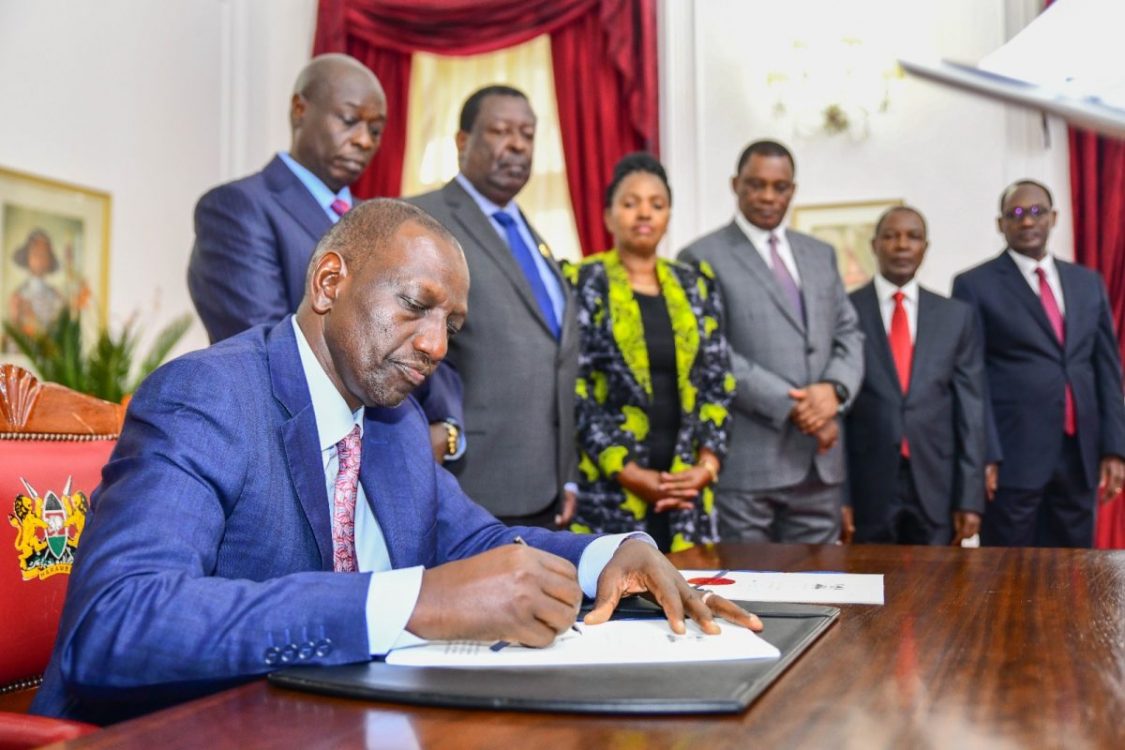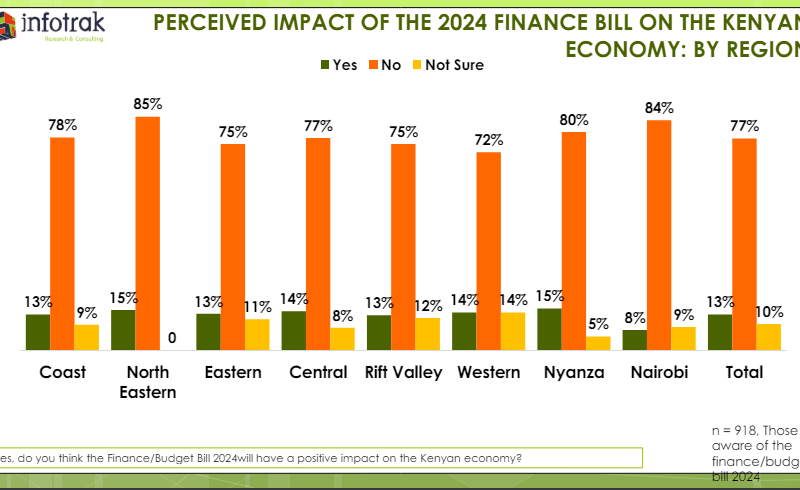77% of Kenyans believe Finance Bill 2024 will have negative impact on economy – Infotrak

A recent survey conducted by Infotrak has revealed that 77% of Kenyans believe the Finance Bill 2024 will negatively impact the Kenyan economy once it becomes law.
The survey asked respondents if they thought the Finance/Budget Bill 2024 would have a positive effect on the economy, with a significant majority expressing concerns over its potential adverse impact.
Finance Bill 2024 reactions
Only 13% of respondents agreed that the Finance Bill would be beneficial to the nation. Among the regions, the North Eastern region had the highest percentage of those who believe the Finance Bill will have a negative impact, with 85% expressing this view and only 15% thinking it would be beneficial.

In Nairobi, 84% of respondents were of the opinion that the Bill would have a negative impact, while in Nyanza, this sentiment was shared by 80%. Other regions showed similar trends: Coast (78%), Central (77%), Rift Valley and Coast (75%), and Western (72%).
The survey was conducted between May 23-29, 2024, using quantitative interviews conducted through Computer Assisted Telephone Interviews (CATI).
The survey sample included 1,700 adult Kenyans aged 18 and above, with 980 respondents having knowledge of the Finance Bill.
Infortrack design
The sampling frame was designed using Population Proportionate to Size (PPS) guided by the 2019 Census. The survey covered all 47 counties and eight regions of Kenya.
The Finance Bill 2024 introduces several significant changes in both business and personal tax regulations. For businesses, the definition of digital content monetization has been broadened to include creative works, material sharing, and other non-exempt items under the Income Tax Act.
The term “donations” is now clearly defined to cover both cash and in-kind contributions, making them deductible for income tax purposes.
The concept of “public entity” has been clarified to include various government bodies and agencies, and a unified definition of “related party” has been established, focusing on direct or indirect control over another business.
The scope of “royalty” payments has been expanded to encompass any software-related fees, and withholding tax on goods supplied to public entities has been set at 3% for residents and 5% for non-residents.
The previous threshold for withholding tax on services has been removed, and the daily penalty for late returns by export processing zone enterprises has been eliminated. The carryforward period for foreign exchange losses has been reduced to three years for specific entities.
Several income tax exemptions have been repealed, including those for amateur sporting associations, registered trust schemes, and certain bonds. A new motor vehicle tax at 2.5%, with a specified range, will be collected by insurers. The penalty for underpayment of instalment tax has been aligned with a lower 5% penalty.
Telecommunications operators can now claim a 10% annual investment allowance on spectrum licenses. Any change in accounting periods must be approved by the Kenya Revenue Authority within six months. The preferential tax rate for companies building 100 residential units annually has been repealed, and the tax rate for nonresident ship and air transport operators has been increased to 3%.
In the digital space, the definition of the digital marketplace now includes ride-hailing, food delivery, freelance services, and more. Withholding tax on digital content and marketplace income is set at 5% for residents and 20% for non-residents. The Digital Services Tax is being replaced by a Significant Economic Presence tax for non-residents with substantial digital engagement in Kenya.
Tax changes
Personal tax changes include the elimination of outdated definitions related to a wife’s employment income. The requirement for retirement schemes to register with the Kenya Revenue Authority has been removed, leaving only registration with the Retirement Benefits Authority.
Allowable pension contributions have been increased, and tax-exempt per diem benefits have been revised. The limit on non-cash benefits has been raised, and the exempt value of meal benefits has been increased. Public officers will now have their reimbursements exempt from income tax.
Additional personal tax adjustments include the designation of contributions to the Social Health Insurance Fund, affordable housing levy, and post-retirement medical fund as deductible. However, tax reliefs for these contributions have been repealed.
The allowable mortgage interest deduction has been increased, and specific pension benefits are now exempt under defined conditions. Remote workers for Kenyan employers must have a Kenya Revenue Authority PIN, and PAYE compliance dates now exclude weekends and public holidays.
Internationally, the bill introduces a minimum top-up tax for entities in multinational groups with a turnover of €750 million or more, ensuring an effective tax rate of at least 15%. An Advance Pricing Agreement regime has been introduced for related party transactions, valid for up to five years.
A capital gains tax rate of 5% is proposed for firms certified by the Nairobi International Financial Centre Authority, subject to certain investment criteria.
For Value Added Tax (VAT), the time of supply for exported goods is now defined as the point when required export documents are confirmed.
The right to offset withholding VAT credits against other taxes has been removed, and the 24-month limit for VAT refund applications has been eliminated. Several products will see changes in their VAT status, moving from exempt to taxable.
For these and more credible stories, join our revamped Telegram and WhatsApp channels.
Telegram: https://t.me/peopledailydigital
WhatsApp: https://whatsapp.com/channel/0029Va698juDOQIToHyu1p2z












